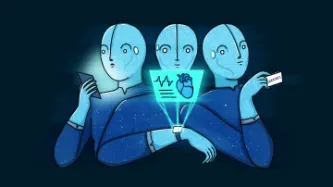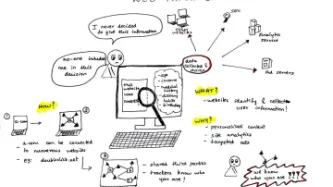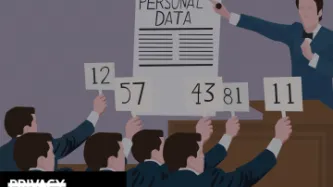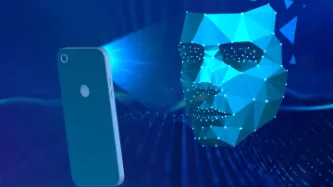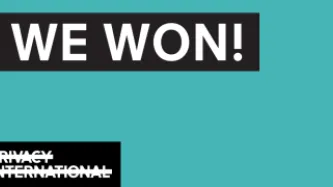Search
Content type: News & Analysis
One of the UK’s largest telecommunications operators, BT, has said to Privacy International that a report claiming it “co-produces malware” with a surveillance company for the GCHQ is inaccurate – but hasn’t said why or given any more details.
The accusation was made by C5IS – a shadowy online publication claiming to be “the most widely read source of information on surveillance technologies”. In its Big Black Book of Electronic Surveillance, it claims that SS8, a…
Content type: Long Read
When you go abroad, you expect to show your passport right? But what if immigration authorities wanted access to your Facebook, Instagram and Twitter accounts before they let you enter a country? What if they wanted to vet you based on your updates, photos, likes, retweets and even your DMs?We think social media companies, who make literally billions of dollars out of you, and wield massive power and influence, should challenge governments on YOUR behalf. They should be protecting their users…
Content type: Case Study
This time, Amtis travels to year 2030 to get a sense of how the data rights framework played out:
I just moved into a new apartment and everything was a mess. My stuff was all over the place and I couldn't find anything. I received a notification on my dashboard that a delivery drone had arrived with my package.
Data rights dashboard
The dashboard showed me a summary report with information about how my data was handled: which company processed my order, the type of data that was collected…
Content type: Case Study
In this next leap to year 2030, Amtis lives the life of a data labourer, being paid wages for data inputs. Here’s how Amtis begins the story:
I am in my green pyjamas, but I can’t say for sure if it’s morning or evening. My eyes are red from staring at screens. I am discouraged and very tired. Of course, all these emotions and reactions are registered by my Playbour – my pocket-sized smart console that has basically become my entire life. It’s my connection to family, friends and the world; my…
Content type: Advocacy
Privacy International has today sent letters to leading social media platforms to ask what they're doing to protect their users' from dangerous surveillance by government immigration authorities.
The letter comes following the implementation of plans by US authorities to require nearly all visa applicants to hand over identifiers of all social media accounts they have used in the previous five years, or face “serious immigration consequences”.
The move not only represents…
Content type: People
Ilia is currently leading our strategic area that challenges government surveillance overreach. She also contributes to PI's legal strategy and is also responsible for some of our litigation and interventions before UK courts and the European Court of Human Rights. She leads our project that challenges mass surveillance to protect civic spaces.
Ilia is a qualified lawyer in Greece and has a PhD in International Law from the Faculty of Law of the University of Geneva, specialising in…
Content type: News & Analysis
Privacy International has joined a global coalition of privacy campaigners, tech companies, and technology experts to respond to proposals by British intelligence chiefs aimed at allowing them access to encrypted messaging apps such as WhatsApp or Signal.
If implemented, the proposals would allow government authorities to force messaging platforms to silently add a law enforcement participant to a group chat or call.
Such a capability poses serious threats to…
Content type: Explainer
Could an app you have never even heard of put you at risk? This is what happened to Chloe (real name has been changed), an investigative journalist exposed by an app that her source was using.
Her source was using TrueCaller, an app that aims to identify phone numbers so users can filter out calls, even if it is from a number they have never encountered before. TrueCaller relies on users tagging numbers who are calling them. And when your number is tagged there is no way for you to know that…
Content type: Case Study
Photo by Roger H. Goun
Chloe is an investigative journalist working for an international broadcast service; we will call the TV show she works for The Inquirer. She travels around the world to work with local journalists on uncovering stories that make the headlines: from human trafficking to drug cartels and government corruption. While her documentaries are watched by many and inspire change in the countries she works in, you would not know who Chloe is if we were to tell you her real name.…
Content type: News & Analysis
US Immigration and Customs Enforcement (ICE), the agency at the centre of carrying out President Trump’s “zero tolerance” approach to immigration enforcement and family separation, has for years been contracting a US surveillance company to intercept peoples’ communications across the United States. The wide potential scope for the use of the powers raises concerns about their use for the real-time surveillance of people, families, and communities caught up in Trump’s immigration crackdown…
Content type: Long Read
Like millions of other people, you use messaging apps, social media, share, read and watch content on your phone or computer. If that’s the case then hundreds of AdTech companies collect and exchange your data every single day. AdTech, a short form of advertisement technology, is a catch-all term that describes tools and services that connect advertisers with target audiences and publishers. It’s also a multi-billion-dollar industry that is facing investigations by Data Protection Authorities…
Content type: Examples
In 2016, Jamie Siminoff, the CEO of the miniature security camera company Ring, emailed his employees information them that the company would adopt a new mission to fight crime by using consumer electronics. The company, which Amazon acquired in 2018, sells its cameras with a social app, "Neighbors", which allows customers to watch their own property and share information about alleged criminality and suspicious individuals with the rest of the people on their block. Ring's hyper-connected…
Content type: News & Analysis
We look at the recently published report on forensic science in the UK, highlight concerns about police not understanding new tech used to extract data from mobile phones; the risk of making incorrect inferences and the general lack of understanding about the capabilities of these tools.
The delivery of justice depends on the integrity and accuracy of evidence and trust that society has in it. So starts the damning report of the House of Lords Science and Technology Select…
Content type: News & Analysis
Photo by Mike MacKenzie (via www.vpnsrus.com)
Ever, a cloud storage app, is an example of how facial recognition technology can be developed in ways people do not expect and can risk amplifying discrimination.
Ever is a cloud storage app that brands itself as “helping you capture and rediscover your life’s memories,” including by uploading and storing personal photos; Ever does not advertise that it uses the millions of photos people upload to train its facial recognition software,…
Content type: Long Read
Details of case:
R (on the application of Privacy International) (Appellant) v Investigatory Powers Tribunal and others (Respondents)
[2019] UKSC 22
15 May 2019
The judgment
What two questions was the Supreme Court asked to answer?
Whether section 67(8) of RIPA 2000 “ousts” the supervisory jurisdiction of the High Court to quash a judgment of the Investigatory Powers Tribunal for error of law?
Whether, and, if so, in accordance with what principles, Parliament may by…
Content type: News & Analysis
Privacy International welcomes WhatsApp's immediate reaction after the revelation that Israeli cyber intelligence company NSO group had exploited a vulnerability in their software. We encourage all WhatsApp users to update their app as soon as possible. However, we believe WhatsApp needs to be much more transparent with their users. We haven't seen a notification on the app itself that would inform users about both, the bug, and the fix. The current version merely states that you can now see…
Content type: Examples
For low-income Americans to receive public benefits they are legally entitled to, they must submit to widespread monitoring of their intimate and personal affairs. This monitoring includes sharing a trove of personal documents and information, unannounced home visits from caseworkers, mandatory face-to-face meetings with caseworkers to review one’s grocery, hygiene, and parenting choices, electronic and physical surveillance, mandatory drug testing, and investigations by fraud control agents…
Content type: Examples
The New York City public benefits system has been criticized for its punitive design, how it too often disciplines, rather than helps, people who are legally entitled to benefits. According to Mariana Chilton, the public benefits system is designed to control, surveil, and penalize low-income people, and it is women of colour who disproportionately bear these burdens. Chilton highlights how the violent treatment of Jazmine Headley and her baby in a public assistance waiting room in December…
Content type: Examples
Private companies are not the only actors pushing for increased control of benefit claimants. The World Bank has also instrumental in funding programmes aiming at assisting government in administrating welfare programmes which has led to futher surveillance of benefits claimants, in December 2016 for instance, they approved a $75 million budget to fund the so-called Social Safety Nets Project in Sri Lanka. The aim is to create a “single registry of citizens containing information on family…
Content type: Examples
The State is not always the only actor involved in the surveillance of benefits claimants. Often those practices are encouraged, facilitated or conducted by private companies. South Africa for instance mandated MasterCard to help distribute benefits through biometric debit cards.
https://www.finextra.com/newsarticle/23941/south-africa-enlists-mastercard-to-distribute-welfare-through-biometric-debit-cards
Publication: FinExtra
Content type: Examples
The surveillance of benefits claimants does not happen only online. In the UK, the Department of Work and Pensions (DWP) is known to be using CCTV footage of public buildings but also gyms and supermarkets to prove some benefits claimants are not actually disabled. Gym memberships are also being requested and an increasing number of private companies are being asked to send their footage for that reason.
https://www.theguardian.com/commentisfree/2018/may/31/benefits-claimants-fear-…
Content type: Examples
In Israel, the National Insurance Institute – in charge of granting benefits – eventually dropped a tender that had caused outrage in the country after being uncovered by Haaretz and Channel 13. The tender revealed the NII was trying to collect online data about benefits claimants – including from social media – to detect cases of frauds. The tender used wheelchair users as an example, suggesting that finding pictures of alleged wheelchair users using bikes on social media could contribute to…
Content type: Examples
The rise of social media has also been a game changer in the tracking of benefits claimants. In the UK in 2019, a woman was jailed after she was jailed for five months after pictures of her partying in Ibiza emerged on social media. She had previously sued the NHS for £2.5 million, after surviving a botched operation. She had argued the operation had left her disabled and the “shadow of a former self” but judges argued that the pictures suggested otherwise.
https://www.dailymail.co.uk/news/…
Content type: Examples
The rise of social media has also been a game changer in the tracking of benefits claimants. Back in 2009, the case of Nathalie Blanchard a woman in Quebec who had lost her disability insurance benefits for depression because she looked “too happy” on her Facebook pictures had made the news.
https://abcnews.go.com/Technology/AheadoftheCurve/woman-loses-insurance-benefits-facebook-pics/story?id=9154741
Author: Ki Mae Heussner
Publication: ABC News
Content type: Examples
In the United States, while everyone is surveilled not every is equal when it comes to surveillance. Factors including poverty, race, religion, ethnicity, and immigration status will affect how much you end up being surveilled. This reality has a punitive effect on poor people and their families and places disproportionate burdens on people of minority groups.
https://tcf.org/content/report/disparate-impact-surveillance/?agreed=1
Author: Barton Gellman and Sam Adler-Bell
Publication: The…
Content type: Examples
Virginia Eubanks explains what we can draw from understanding the experience of surveillance of marginalised groups: it is a civil rights issue, technologies carry the bias of those who design them, people are resisting and why we need to move away from the privacy rights discourse.
https://prospect.org/article/want-predict-future-surveillance-ask-poor-communities
Author: Virginia Eubanks
Publication: The American Prospect
Content type: Examples
This article is an overview of some of the research documenting how people in vulnerable positions are the ones most affected by government surveillance.
https://stateofopportunity.michiganradio.org/post/technology-opportunity-researcher-says-surveillance-separate-and-unequal
Author: Kimberly Springer
Publication: State of Opportunity Michigan Radio
Content type: Examples
In August 2017, it was reported that a researcher scraped videos of transgender Youtubers documenting their transition process without informing them or asking their permission, as part of an attempt to train artificial intelligence facial recognition software to be able to identify transgender people after they have transitioned.
These videos were primarily of transgender people sharing the progress and results of hormone replacement therapy, including video diaries and time-lapse videos. The…
Content type: Long Read
Imagine that every time you want to attend a march, religious event, political meeting, protest, or public rally, you must share deeply personal information with police and intelligence agencies, even when they have no reason to suspect you of wrongdoing.
First, you need to go to the police to register; have your photo taken for a biometric database; share the contacts of your family, friends, and colleagues; disclose your finances, health records, lifestyle choices, relationship status, and…



